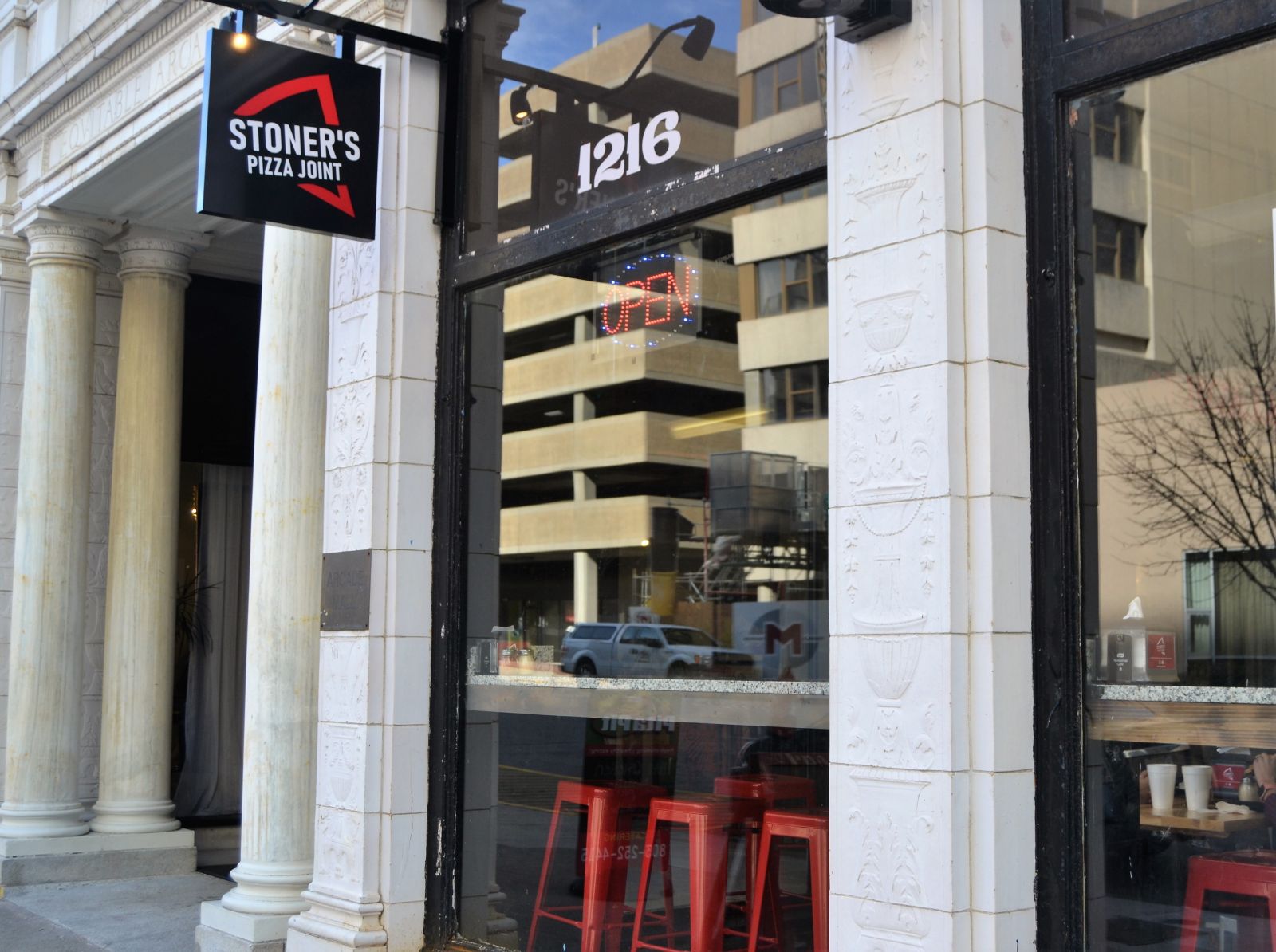Stoner’s brings different flavor to pizza scene
Melinda Waldrop //February 7, 2019//
This is not your father’s pizza joint.
Regional pizza chain Stoner’s Pizza opened its first Columbia location last month at 1216 Washington St. in downtown Columbia. But the Arcade Mall store and its brick-and-mortar ilk are not the focus of chief concept officer Nick Bergelt’s wide-ranging vision.
 Bergelt, a 2007 graduate of the University of South Carolina’s Darla Moore School of Business, is the founder of HospitalityX, a holding company that took over the Stoner’s Pizza Joint brand in January 2018. The new owners acquired a chain with more than 25 locations but “zero technology,” Bergelt said. “They were taking orders by fax. Therein lay the opportunity, just because it was so antiquated. It was a blank-canvas opportunity to rebuild the brand.”
Bergelt, a 2007 graduate of the University of South Carolina’s Darla Moore School of Business, is the founder of HospitalityX, a holding company that took over the Stoner’s Pizza Joint brand in January 2018. The new owners acquired a chain with more than 25 locations but “zero technology,” Bergelt said. “They were taking orders by fax. Therein lay the opportunity, just because it was so antiquated. It was a blank-canvas opportunity to rebuild the brand.”
After shutting down 12 underperforming stories, Bergelt’s group launched a wholesale rebranding effort, using a technology-centric approach to target a millennial market accustomed to on-demand ordering.
“We strongly believe that the brick-and-mortar experience is going to decline over time and people are going to expect what they need to show up whenever they want it,” Bergelt said.
More than 50% of Stoner’s revenue comes from delivery, Bergelt said, spurring a digital-first strategy that will include the rollout of a customized app this month. That doesn’t mean, however, that Stoner’s is an impersonal company.
“We’re a hospitality-first culture,” said Bergelt, with an emphasis on customer service even if that experience consists of a three-minute interaction with a pizza-delivery driver.
To that end, Stoner’s chose not to partner with a third-party delivery service such as Grubhub. “If something goes wrong with the delivery, (customers) don’t blame Uber or the third-party service,” Bergelt said. “They just chalk it up to the brand.”
That said, Bergelt envisions radical changes in the delivery experience. Investments in artificial intelligence and logistics software may soon lead to an autonomous car carrying pizza in a heated cabinet with a code for customers to enter, voice-recognition ordering or pizzas dropped on doorsteps by drone.
“All of this used to be just science fiction, but the reality is all of the technology is there,” Bergelt said. “We’re constantly trying to re-envision not only what the pizza space looks like but effectively the restaurant industry in general.”
Bergelt has been immersed in that industry since graduating from USC with a double major in entrepreneurial studies and marketing with a minor in hospitality. He immediately opened a restaurant in Charleston, and “I’ve been at it since,” he said. “I’m excited to be back in Columbia. I spent five years of my life there, loved the town, and thought it was a good place to stamp our brand in stone.”
While Columbia’s student population makes it attractive to Stoner’s target audience, Bergelt said the university will provide resources to the business. Stoner’s is partnering with management and entrepreneurial students who will serve as strategy consultants, he said.
Along with cutting-edge technology, Stoner’s is targeting its audience by playing up the irreverent associations of its name, common slang for users of marijuana. Counter workers wear T-shirts with slogans such as “Legalize marinara,” accenting what Bergelt calls a “bold and in-your-face” branding strategy.
“We feel we are right on the cusp of a major culture shift, and we’re able to have some fun with it,” said Bergelt, whose company’s holdings also include a taco-and-tequila brand, a salad chain and a whiskey bar and cocktail lounge.
Bergelt said new twists such as sodas infused with cannabidiol, or CBD oil, are being developed, both to play with that image and as part of Stoner’s emphasis on made-from-scratch ingredients. An extract of cannabis plants, CBD oil is not an intoxicant but has gained popularity among those who believe it helps with issues from inflammation to sleeplessness.
“We’re a firm believer in the health implications of what CBD can do and blending that into food and beverage,” Bergelt said. “We have a first-mover advantage there. It’s a natural fit.”
Stoner’s has the flexibility to try such out-of-the-box marketing moves because it’s “small and scrappy,” Bergelt said. That nimbleness is also reflected in the company’s practice of hiring of entrepreneurial-minded employees and rewarding top performers with their own stores.
“It gives us a different kind of professional pipeline and allows us to grow a little bit faster with a different level of engagement” than traditional franchisee models that require higher net worth as an entry point, Bergelt said.
Franchisees are key to Stoner’s growth, Bergelt said. Stemming from a central radius like Columbia’s Washington Street location, smaller stores with less need for Class A real estate will sprout up regionally, he said. Stoner’s recently signed an eight-unit franchisee agreement in Texas, Bergelt said, and is working on a three-unit deal in Florida and an eight-unit agreement in the Upstate.
Smaller stores — some with as little as 400 square feet of counter space — in non-prime locations allow for cost-effective openings and an immediate return on investment that appeals to both up-and-coming operators and major industry players, Bergelt said.
“I doubt we’re going to go into a market where pizza doesn’t exist,” Bergelt said. “It is anywhere and everywhere, (but) we’re all at a place and time where we know things are changing. This a long game. We understand millennial preferences moving forward, (and) technology is where we’re going to stand out on the basis of being able to serve our customers better.”
F
















